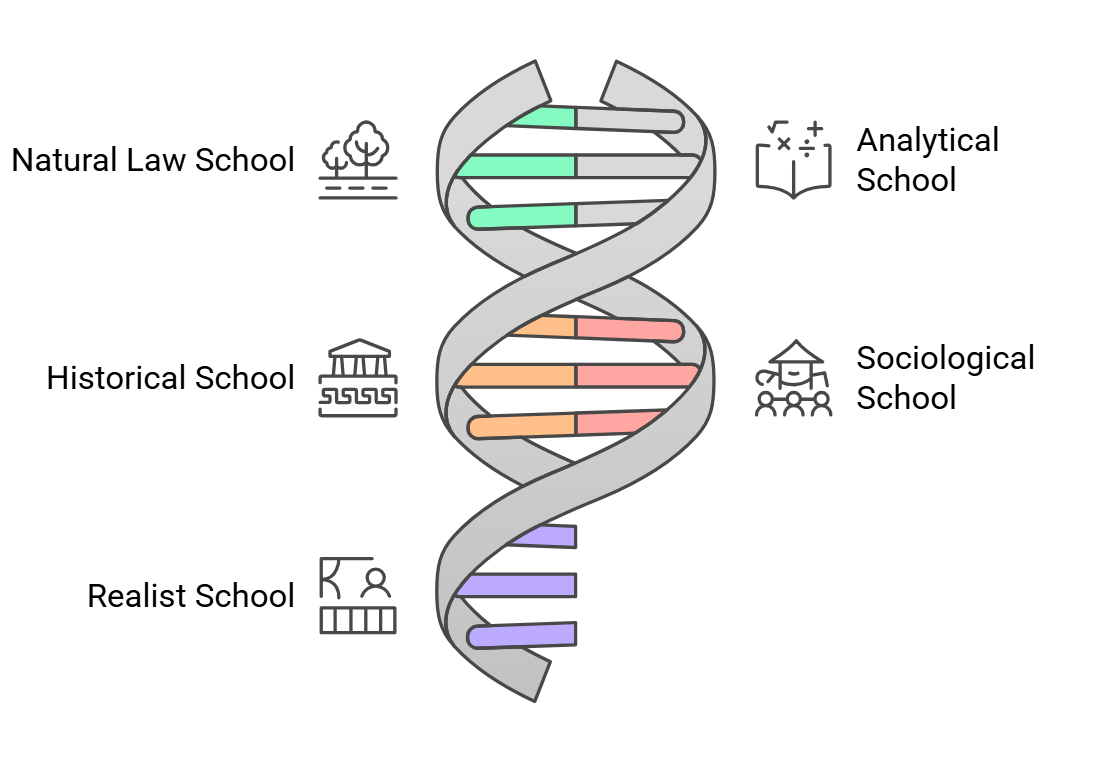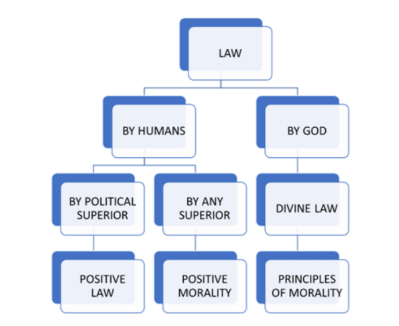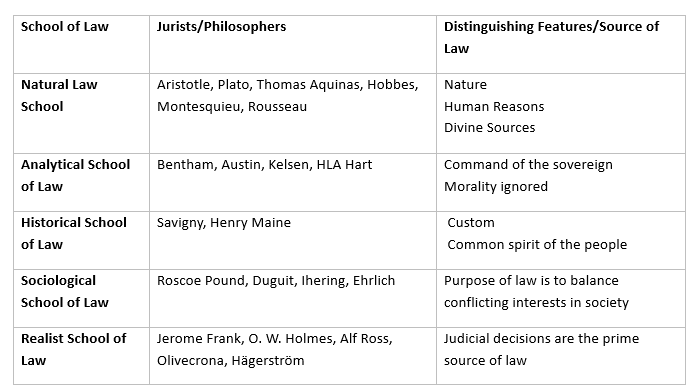Jurisprudence, Nature and Meaning of Law | Legal Studies for Class 11 - Humanities/Arts PDF Download
| Table of contents |

|
| Introduction |

|
| Historical Perspective |

|
| The Case of the Speluncean Explorers |

|
| Schools of Law |

|
| Function and Purpose of Law |

|
Introduction
Justitia, the Roman goddess of justice, is often depicted wearing a blindfold and holding a sword and scales. Representations of Lady Justice in Western traditions also show her in flowing robes, symbolizing fair and impartial administration of law. Law and the legal system are crucial for any civilization, ensuring orderly social life and the very existence of mankind. Therefore, understanding the meaning of law is essential.

- Law can be described as a system of rules and regulations recognized as binding by a country or society, enforceable by authorities, and whose violation attracts punitive action.
- These laws are typically found in constitutions, legislations, and judicial decisions.
- Jurists and legal scholars have different views on defining law, often considering it a reflection of divine reason or a divinely ordered rule.
- This has led to various schools of law, each with its own concept of law.
Historical Perspective
Plato and Aristotle, ancient philosophers, had different approaches towards law. Plato, concerned with eternal forms, symbolized an idealistic approach, while Aristotle focused on the temporal and mutable world, representing a practical approach.
The Case of the Speluncean Explorers
The Case of the Speluncean Explorers is a fictional legal scenario created by Lon Fuller in 1949 for the Harvard Law Review. Set in the imaginary Commonwealth of Newgarth in the year 4300, the case presents a moral and legal dilemma faced by a group of cave explorers trapped underground. Fuller's article outlines five different judicial perspectives on whether the survivors should be held legally responsible for their actions. This thought experiment has become a classic in legal theory and jurisprudence, illustrating the complexities of law and morality in extreme situations.
Background
- In 1949, Lon Fuller created a fictional legal case called the "Case of the Speluncean Explorers" for the Harvard Law Review.
- This case is set in the imaginary Commonwealth of Newgarth in the year 4300.
- Fuller presents five different ways a court could respond to the situation, each with a unique perspective on whether the explorers should be punished for breaking the law.
- The case has been recognized as a classic in the study of law and legal theory from the mid-20th century.
Facts
- Five cave explorers, including Roger Whetmore, get trapped in a cave after a landslide.
- They have very little food and no way to get more inside the cave.
- Rescuing them is tough, takes a long time, and costs a lot because of the cave's remote location.
- During the rescue, ten workers lose their lives.
- On the 20th day of being trapped, they manage to contact the rescue team and find out it will take another 10 days to free them.
- Medical experts inform the explorers that they probably won’t survive another 10 days without food.
- The explorers ask the doctors if they could survive by killing and eating one of their group.
- The doctors, though unsure, say they might survive.
- No one on the rescue team agrees to hold a lottery to decide who to kill when asked, so the radio is turned off.
- Later, the explorers decide to hold a lottery to choose who will be killed and eaten.
- Roger Whetmore suggests using a pair of dice to make the decision.
- Before the dice are rolled, Whetmore changes his mind and says he will wait another week.
- The others accuse him of betraying their trust and decide to roll the dice anyway.
- Whetmore does not raise any objections before the dice are thrown on his behalf, and he loses.
- As a result, Whetmore is killed and eaten by the other explorers.
- After being rescued and recovering, the survivors are charged with Whetmore's murder.
- In the Commonwealth of Newgarth, the punishment for murder is death by hanging.
- Based on the jury's findings, the trial judge declares the defendants guilty of murder and sentences them to hang.
- After the trial, both the judge and jury petition the Chief Executive of Newgarth to reduce the survivors' death sentences to six months in prison.
- The Chief Executive decides to wait for the Supreme Court's ruling on the petition before making a decision about clemency.
Jury involved in Judgement
- Chief Justice Truepenny
- Justice Foster
- Justice Tatting
- Justice Keen
- Justice Handy
Question to consider
Should the explorers be found guilty or not guilty of murder?
Opinion of Chief Justice Truepenny
Verdict: Guilty
- Chief Justice Truepenny believes that in this special case, the actions of the jury and trial judge were not just fair and wise, but the only correct ones under the law.
- He thinks the law is clear and must be followed by the courts. Public opinion should not influence legal decisions.
- Mercy should be left to the executive branch, not the judiciary.
- Truepenny suggests seeking clemency from the Chief Executive to balance justice and the law.
Opinion of Justice Foster
Verdict: Innocent
- Justice Foster argues that the explorers were outside normal society and subject to natural laws, not man-made ones.
- He suggests a purpose-driven interpretation of the law, emphasizing that the goal of criminal law is deterrence.
- Punishing the explorers wouldn't deter future offenders. He believes judges have some flexibility in interpreting laws, especially in unusual cases.
- Foster concludes the conviction should be overturned.
Opinion of Justice Tatting
Verdict: Uncertain; Recuses
- Justice Tatting struggles to decide due to conflicting emotions and legal arguments.
- He questions the application of natural law and the difficulty in justifying the explorers' actions.
- Tatting ultimately withdraws from the case, unable to reach a conclusion.
Opinion of Justice Keen
Verdict: Guilty
- Justice Keen separates legal and moral aspects, stating that the court's role is not to decide on executive clemency or morality.
- He criticizes emotional influences on judgments and emphasizes the importance of upholding the law. Keen affirms the guilty verdict.
Opinion of Justice Handy
Verdict: Innocent
- Justice Handy advocates for a common-sense approach, considering public opinion and practical wisdom.
- He believes judges should align with the majority sentiment to maintain public trust.
- Handy argues for the innocence of the defendants to uphold harmony between the judiciary and the public.
Verdict by the Court
- The Supreme Court, evenly split, upheld the conviction. The trial judge and jury members request the Chief Executive to commute the death penalty to six months' imprisonment for the surviving explorers.
Schools of Law
The major schools of law include-
1. Natural Law School
2. Analytical School
3. Historical School
4. Sociological School
5. Realist School

Natural Law School
- Natural law is often described as the law of nature, divine law, which is eternal and universal.
- Its meaning has changed over time. Initially, it was linked to theology, but it was also used for secular purposes. Natural law is believed to exist independently of human will.
Understanding Natural Law
- Natural law is considered "natural" because it is not created by humans but discovered through nature.
- The theory of natural law varies in its goals and content, but it is based on a central idea: there is a higher law rooted in morality against which human laws can be judged.
- At the core of this theory is the belief in universal moral laws that human laws must not violate, or they lose their legal and moral authority.
Connection Between Law and Morality
- Natural law theory emphasizes the essential link between law and morality. Law is not just what is written in statutes; if legislation is immoral, it is not law.
- St. Thomas Aquinas referred to law without moral content as a "perversion of law."
- Proponents of natural law argue that law and morality are connected, expressed in the maxim "Lex iniusta non est lex" (an unjust law is not a true law).
- This means that if something is not a true law, it does not need to be followed. The concept of law cannot be fully explained without referring to morality.
The Role of Morality in Law
- While classical naturalists believed that law includes all moral principles, this does not mean that law is solely about moral principles. It is to show that legal norms created by humans are valid only if they align with morality.
- In the 19th century, jurists like Bentham and Austin rejected natural law principles due to its vague nature. However, focusing too much on morality reduced law to a command of force, failing to meet societal aspirations. Excessive emphasis on historical approaches to law contributed to the rise of fascism in Italy and Nazism in Germany.
- The post-World War I rise of materialism prompted a reevaluation of legal regimes in the West, leading to a revival of natural law theory in a modified form, different from its traditional version.
Rule of Law and Principles of Natural Justice
Rule of Law
- The Rule of Law signifies the supremacy of law over all individuals, including those in positions of power. It encompasses the principles of equality and non-arbitrariness, which are integral to the concept.
- Described as a fundamental principle of the Constitution, the Rule of Law, according to Max Weber, embodies "legal domination" and governance by law rather than by individuals.
- Essentially, the Rule of Law mandates that everyone, from the government and its officials to citizens, must act in accordance with the law.
- This doctrine emphasizes the supremacy of law, ensuring that no one is above the law, including the actions of the state’s executive branch.
- The Rule of Law also imposes a duty on citizens in a parliamentary democracy to obey the law, which must be just and not arbitrary or oppressive.
Principles of Natural Justice
Natural Justice refers to the fundamental standards or principles that administrative authorities must adhere to when making decisions with civil implications. In India, these principles are firmly rooted in Articles 14 and 21 of the Constitution. With the introduction of substantive and procedural due process in Article 21, the concept of fairness, integral to Natural Justice, is encompassed within Article 21. Violating the principles of Natural Justice leads to arbitrariness and infringes upon the equality clause of Article 14.
The principles of Natural Justice include:
- Nemo judex in causa sua: This principle, also known as the rule against bias, states that no one should be a judge in their own cause.
- Audi alteram partem: This principle emphasizes the importance of hearing both parties, ensuring fair hearing, and preventing condemnation without being heard.
Analytical School
The Analytical School often known as the Positive or Imperative School, aims to establish a scientifically valid system of law by examining legal concepts through empirical methods. It emerged as a response to the School of Natural Law. Founders like Jeremy Bentham and John Austin criticized natural law for being vague and abstract. Bentham and Austin emphasized the separation of law and morality, arguing that law is man-made and enacted by the legislature.
Key Features of the Analytical School
- Separation of Law and Morality: Positivists believe that law, once enacted, must be obeyed, regardless of its moral implications. Natural law thinkers, on the other hand, argue that immoral laws do not require obedience.
- Law as Command: John Austin defined law as the command of the sovereign, backed by the threat of punishment. He sought to clarify the distinction between law and morality, asserting that natural law doctrines blurred this line.
- Role of the Sovereign: Austin described the sovereign as a person or group to whom society habitually obeys. Commands from the sovereign are obligations for political inferiors (citizens), and disobedience leads to punishment.
- Positive Law vs. Principles of Morality: Positive law, as defined by Austin, differs from principles of morality, which view law as the law of God. Positive morality, on the other hand, considers law as man-made rules of conduct, such as customary rules and international law.

Historical School
History is seen as the basis of knowledge in today's world. Followers of the historical school believe that laws come from the interaction between local circumstances and the conditions of the people. This school argues that law should reflect the local needs and sentiments of society. It emerged as a response to natural law and positivism, highlighting the irrational, racial, and evolutionary aspects of law.
According to jurist Friedman, Savigny’s historical school can be summarized as:
- Law reflects the common spirit and customs of the people.
- Law is particular to each society, like its language.
- Law is dynamic and evolves with society.
- Law is not imposed by a political authority but is found or created by the people.
Sir Henry James Sumner Maine, a British jurist and legal historian, was a leading figure in the British Historical School of Jurisprudence. He focused on comparative law, primitive law, and anthropological jurisprudence.
Criticism of Historical Approach: Despite its contributions, the historical approach has faced criticism for being vague, narrow-minded, and lacking scientific rigor in its explanation of law.
Sociological School
The Sociological School views law as a social phenomenon, focusing on how law is perceived by people within society. This approach emphasizes the need to balance conflicting interests within society. Proponents of this school believe that law exists to meet the needs of society and see law as a tool for social change.
Key Features of the Sociological School
- Purpose and Function: The sociological school highlights the purpose and function of law rather than its content. Law is seen as a social institution designed to meet societal needs.
- Tool for Balancing Interests: Law is viewed as a tool to balance conflicting interests within society.
Roscoe Pound and Sociological Jurisprudence
Roscoe Pound, an American jurist, is considered a leading figure in sociological jurisprudence. He emphasized the importance of law in balancing social interests and addressing societal needs.
Realist School
- Realists focus on judge-made laws as the true essence of law, prioritizing them over traditional rules and concepts.
- They believe that laws are not static; they evolve and change over time.
- While realists acknowledge the existence of laws enacted by legislative bodies, they view judge-made laws as more reflective of the actual legal landscape.
Realism stands in contrast to idealism. It merges elements of analytical positivism, which emphasizes the objective analysis of legal concepts, with sociological jurisprudence, which considers the social context of law.
The Role of Judges
- Realists highlight the crucial role of judges in implementing, interpreting, and developing the law.
- They argue that a judge's social, economic, and psychological background significantly influences their decision-making process.
Karl Llewellyn, a prominent figure in the realist school, identified key characteristics of realism:
- Law is dynamic and constantly changing.
- Law serves a social purpose and aims to achieve societal ends.
- Society evolves more rapidly than the law can keep up with.
- Legal certainty is elusive; court decisions are influenced by various factors, including judges' backgrounds.
- Case studies are vital, and courtrooms function as laboratories for testing legal principles.
 Schools of Law
Schools of Law
Function and Purpose of Law
Law serves several crucial functions in society:
- Deliver Justice: Ensuring fair treatment and resolution of disputes.
- Provide Equality and Uniformity: Ensuring all individuals are treated equally under the law.
- Maintain Impartiality: Ensuring unbiased administration of justice.
- Maintain Law and Order: Preventing chaos and ensuring societal stability.
- Maintain Social Control: Regulating behavior to conform to societal norms.
- Resolve Conflicts: Providing mechanisms for peaceful dispute resolution.
- Bring Orderly Change: Facilitating social reforms and orderly changes in society.
|
69 videos|80 docs|25 tests
|
FAQs on Jurisprudence, Nature and Meaning of Law - Legal Studies for Class 11 - Humanities/Arts
| 1. What is the significance of the 'Case of the Speluncean Explorers' in legal studies? |  |
| 2. How do different schools of law interpret the function and purpose of law? |  |
| 3. What are the key components of jurisprudence in understanding the nature and meaning of law? |  |
| 4. How does historical perspective influence contemporary legal systems? |  |
| 5. What are the main challenges faced by legal scholars in defining the nature of law? |  |















